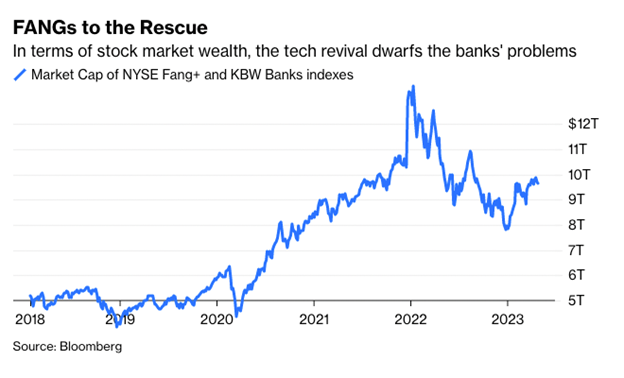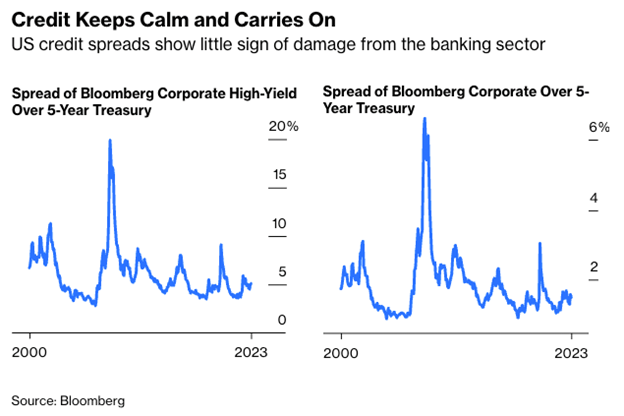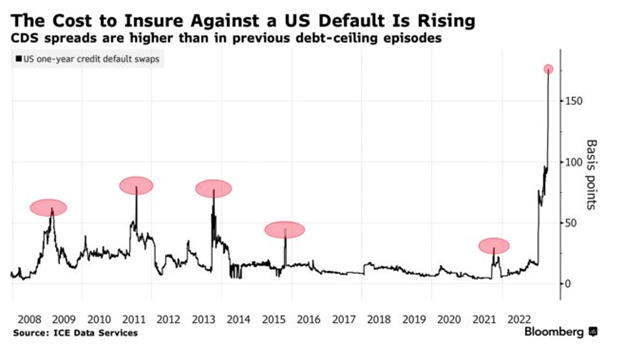Earnings Boost Stocks
Quick Take: Strong corporate earnings boosted stocks, which notched another month of gains.
Nearly 80% of earnings results so far have beat expectations, with over half of S&P 500 companies reporting.[1] Some of the biggest U.S. corporations helped push the S&P 500 higher by 1.5% in April, as the index notched its second consecutive month of gains.[2]
A small number of tech companies have been driving much of the stock market gains – out of the 8% rise in the S&P 500 this year, 80% of the increase has been driven by just seven companies, according to Bloomberg data.[3] Apple and Microsoft have now contributed nearly half of S&P 500 gains in 2023, as strong Microsoft earnings fueled another tech rally to end April.[4]

Source: https://www.bloomberg.com/opinion/articles/2023-04-28/banks-versus-fangs-first-republic-just-doesn-t-matter-that-much
Bank Sector Overhang
As tech outperformance continues to counter banking underperformance, regional banking concerns aren’t entirely in the rearview mirror yet. Shares in First Republic Bank started plunging the final week of April after it revealed over $100 billion in deposit outflows in the first quarter.[5] By the end of the month, regulators were auctioning the bank off to the highest bidder. As the 14th biggest lender, First Republic was actually larger than Silicon Valley Bank — the biggest US bank to shut in March.[6]
The bond market overall does not seem very concerned, with credit spreads reflecting corporate confidence and a sense of calm.[7] That being said, since we’re already seeing regional banks’ credit and deposit growth turn negative, a contraction in lending could be around the corner.[8] Lower availability of credit could slow down the economy.

Source: https://www.bloomberg.com/opinion/articles/2023-04-28/banks-versus-fangs-first-republic-just-doesn-t-matter-that-much?leadSource=uverify%20wall
Given the uncertainty, investors began reducing their bets on an interest rate hike in May but the Fed raised interest rates by 0.25 percentage points following its May meeting this week.[9] Fed officials have noted that any tightening in banking lending standards could end up weighing on spending and growth, lessening the need for rate hikes. [10]
No Recession Reported
Despite speculation that the US economy could be headed towards a downturn, April economic reports indicated that a recession can wait — the Commerce Department reported growth in first quarter GDP and higher consumer spending in the first quarter than the fourth quarter of last year. [11]
Not only are consumers still spending on goods and services, but companies are still hiring. Unemployment claims are still low by pre-pandemic standards.[12] As a result, underlying inflation pressures remain strong.[13]
However, retail sales are starting to cool as household spending momentum slows. [14] Although consumers have been fairly resilient in shouldering higher prices, it remains an open question whether this dynamic will continue.
Meanwhile, Treasury bond markets are still reflecting recession risks – the bond market’s recession indicator has flashed signs of an upcoming downturn for months, and Bank of America strategists think it could kick off this quarter. [15] Recession chatter is likely to continue as we see the impact of high interest rates filter through the economy.
Debt Ceiling Jitters
As we discussed earlier in the year, the US reached its federal debt ceiling limit in January. Federal debt funds the gap between taxes and spending. This includes already authorized spending, and President Biden has long maintained that he would not negotiate spending cuts as part of discussions over raising the nation’s debt limit.[16] So far, the Treasury department has used extraordinary accounting measures to continue paying its bills, though these options could be exhausted by June.[17]
In the last week of April, House Republicans passed a bill raising the debt limit for one year, contingent on deep spending cuts.[18] The bill is essentially dead on arrival to the Democratic-led Senate, since Democrats want an unconditional debt limit increase.[19]
If the government defaults because it can’t pay its bills and issue new debt, the consequences would be economically severe. It’s almost impossible to fathom that the US might not pay its bills, considering America has never defaulted, and Treasuries are widely considered a “risk-free” asset.[20]
Given the partisan standoff, the cost to insure against a US default is rising compared to previous debt ceiling episodes, although trading is not very active.

Source: https://www.bloomberg.com/news/articles/2023-04-28/bets-offering-2-400-payout-on-us-default-lure-growing-crowd?cmpid=BBD042923_WKND&utm_medium=email&utm_source=newsletter&utm_term=230429&utm_campaign=weekendreading
We have history on our side and still expect lawmakers to set aside their differences to raise the limit once again. In the meantime, negotiations might still spur jittery markets.
Looking Ahead
Markets have been fairly resilient as investors look for the end of this rate hike cycle. There’s a Wall Street saying that “The Fed tightens until something breaks,” and as we face another bank failure, the Fed may soon be able to pause its tightening.[21] Trader bets continue to estimate that the Fed will have to cut rates this year, but in BlackRock’s view, hoping for the Fed to rescue markets is the old playbook.[22] We may have to live with higher rates for longer to tame inflation.
No matter how the end of the Fed rate hike cycle plays out, the only certainty is that markets will rise and fall on their own terms. Taking a disciplined and long-term strategic view is the name of the game in this regime of higher macroeconomic uncertainty. We continue to search for and implement varying strategies to navigate the inevitable challenges while attempting to take advantage of potential opportunities.
We are all cognizant of the stress and pressure on many of you due to the WGA work stoppage. Please reach out if you want to review any of your accounts along with liquidity options through this challenging time.
Your Friends at JSF
The information expressed herein are those of JSF Financial, LLC, it does not necessarily reflect the views of NewEdge Securities, Inc. Neither JSF Financial LLC nor NewEdge Securities, Inc. gives tax or legal advice. All opinions are subject to change without notice. Neither the information provided, nor any opinion expressed constitutes a solicitation or recommendation for the purchase, sale or holding of any security. Investing involves risk, including possible loss of principal. Indexes are unmanaged and cannot be invested in directly.
Historical data shown represents past performance and does not guarantee comparable future results. The information and statistical data contained herein were obtained from sources believed to be reliable but in no way are guaranteed by JSF Financial, LLC or NewEdge Securities, Inc. as to accuracy or completeness. The information provided is not intended to be a complete analysis of every material fact respecting any strategy. The examples presented do not take into consideration commissions, tax implications, or other transactions costs, which may significantly affect the economic consequences of a given strategy. Diversification does not ensure a profit or guarantee against loss. Carefully consider the investment objectives, risks, charges and expenses of the trades referenced in this material before investing.
Asset Allocation and Diversification do not guarantee a profit or protect against a loss.
The Bloomberg Barclays U.S. Aggregate Bond Index measures the investment-grade U.S. dollar-denominated, fixed-rate taxable bond market and includes Treasury securities, government-related and corporate securities, mortgage-backed securities, asset-backed securities and commercial mortgage-backed securities.
The S&P 500 Index is an unmanaged, market value-weighted index of 500 stocks generally representative of the broad stock market.
The Nasdaq Composite is a market-capitalization-weighted index consisting of all Nasdaq Stock Exchange listed stocks that are not derivatives, preferred shares, funds, exchange-traded funds or debenture securities.
Treasury Bond- is a U.S. government debt security with a fixed interest rate and maturity between two and 10 years.
Gross domestic product (GDP) is a monetary measure of the market value of all the final goods and services produced in a specific time period. GDP is the most commonly used measure of economic activity.
By clicking on these links, you will leave our server, as they are located on another server. We have not independently verified the information available through this link. The link is provided to you as a matter of interest. Please click on the links below to leave and proceed to the selected site.
[1] https://www.ft.com/content/d796d5ee-6088-47e2-a34c-52f83dae2328
[2] https://www.wsj.com/articles/global-stocks-markets-dow-news-04-28-2023-434d977a
[3] https://www.ft.com/content/a278dac8-39d1-4985-8a3b-5a50077dacb6
[4] https://finance.yahoo.com/news/apple-microsoft-never-held-more-100156014.html
[5] https://www.ft.com/content/5f7b8cd0-ab9b-4816-b06e-cf0b58c436b7
[6] https://www.reuters.com/business/finance/pnc-jpm-putting-final-bids-first-republic-fdic-auction-sources-2023-04-30/
[7] https://www.washingtonpost.com/business/2023/04/28/banks-versus-fangs-first-republic-just-doesn-t-matter-that-much/1ef0acde-e57c-11ed-9696-8e874fd710b8_story.html
[8] https://www.morganstanley.com/ideas/bond-market-recession-signals-q2-2023
[9] https://www.nbcnews.com/business/economy/federal-reserve-next-interest-rate-hike-may-2023-how-much-rcna82277
[10] https://www.bloomberg.com/news/articles/2023-04-26/first-republic-strain-poses-question-for-fed-as-it-weighs-hike
[11] https://www.wsj.com/articles/recession-can-waitthe-gdp-reports-bright-side-c309e932
[12] https://www.wsj.com/articles/recession-can-waitthe-gdp-reports-bright-side-c309e932
[13] https://www.reuters.com/markets/us/us-consumer-spending-flat-march-core-inflation-still-strong-2023-04-28/
[14] https://nz.news.yahoo.com/us-retail-sales-decline-second-125407314.html
[15] https://markets.businessinsider.com/news/bonds/recession-indicator-us-economy-inverted-yield-curve-rates-stocks-bofa-2023-4
[16] https://www.nytimes.com/2023/04/27/us/politics/biden-debt-ceiling.html
[17] https://www.nytimes.com/2023/04/27/us/politics/house-debt-limit.html
[18] https://www.nytimes.com/2023/04/27/us/politics/biden-debt-ceiling.html
[19] https://www.nytimes.com/2023/04/27/us/politics/house-debt-limit.html
[20]https://www.bloomberg.com/news/articles/2023-04-28/bets-offering-2-400-payout-on-us-default-lure-growing-crowd
[21] https://www.wsj.com/articles/fed-walks-tightrope-between-inflation-and-financial-instabilitybut-for-how-long-789283d0
[22] https://www.cnbc.com/2023/03/28/blackrock-warns-that-investors-are-making-a-mistake-by-betting-on-the-fed-to-cut-rates.html
